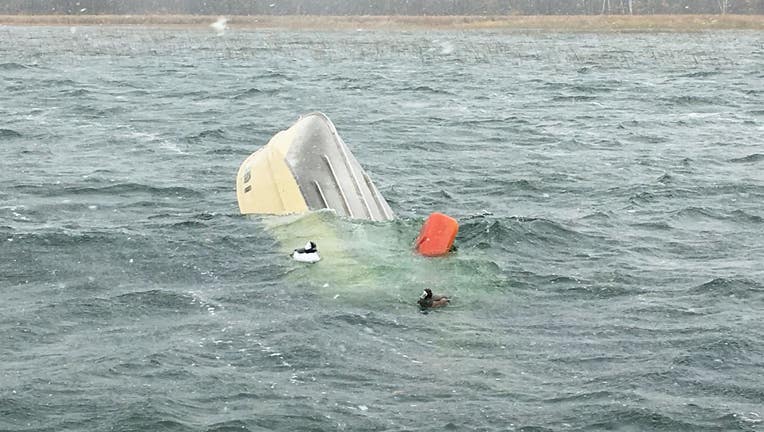Duck hunters credit life jackets with saving lives after boat takes on water in northern Minnesota

A group of duck hunters had to swim to shore after their boat started taking on water on a snowy, windy day on North Long Lake. (Minnesota Department of Natural Resources / FOX 9)
BRAINERD, Minn. (FOX 9) - Four duck hunters in Minnesota who had to swim to shore after their boat started taking on water are crediting the life jackets they were wearing with saving their lives.
The group was fishing on North Long Lake near Brainerd earlier this month when snow and a 24-mile per hour wind forced them to call it a day around mid-morning, according to a release from the Minnesota Department of Natural Resources.
The group tried to stick close to shore as they made their way back towards the boat access, but their 16-foot boat started taking on water as waves whipped up by the wind crashed over the bow.
It quickly became clear to the hunters the boat was not going to make it to shore. They threw their duck decoys overboard, hoping to use them to float, and swam for shore.
The hunters were all wearing life jackets when they went into the water.
As soon as he made it to shallow water, one of the hunters called 911.
All four hunters were exhibiting signs of hypothermia. First responders transported them to a nearby hospital for evaluation.
The hunters and the DNR both say if the group had not been wearing life jackets, the outcome would have been much different.
“Without the life jackets, we wouldn’t have been able to swim back,” the hunter who called 911, 24-year-old Alec Stark, told the DNR. “And had we not already been wearing them, there wouldn’t have been time to put them on. The shock of the cold water – you can’t even think. You’re just trying to breathe.”
The DNR said anyone who boats during the cold-water season should wear a life jacket.
Nine people have died so far this year in boating accidents in Minnesota, according to the DNR. Although the majority of boating accidents occur in the summer, boating accidents that occur during the cold-water season are more likely to be fatal.

